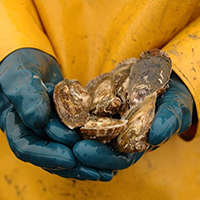Woods Hole Sea Grant Provides More Than $19,000 in COVID-19 Related Rapid Response Grants to Support Cape Cod Municipal Shellfish Efforts

Joint Effort with Cape Cod Cooperative Extension Yields Strong Results Benefitting Both Recreational and Commercial Fisheries Across Region
Media Advisory
December 2, 2020
For Immediate Release
Contact: Harriet Booth, Woods Hole Sea Grant and Cape Cod Cooperative Extension
harriet.booth@barnstablecounty.org
(508) 375-6634
(Woods Hole, Mass.) – The Woods Hole Sea Grant program (WHSG) recently provided $19,400 in COVID-19 related rapid response grants to four Massachusetts towns to assist with municipal shellfish propagation efforts severely impacted by the pandemic.
The funding for Barnstable County’s shellfish and natural resources departments comes as towns are seeing a reduced number of volunteers and cuts to shellfish resource budgets, while at the same time experiencing growth in recreational harvest, all factors that can be attributed, in part, to the impacts of COVID, according to Harriet Booth, marine resource specialist at WHSG and Cape Cod Cooperative Extension, which partnered on the program.
Funding went to:
- The Town of Wellfleet to purchase three inch or larger overstock oysters from local growers and distribute these in recreational-only harvest areas, to meet the increased demand of recreational harvest due to COVID. This funding allows the town to use their current propagation budget to purchase quahog seed destined for the wild commercial fishery.
- The Town of Provincetown received a grant to hire 3-6 growers to relay oysters from a restricted area to an open (but currently closed) recreational harvest area. In addition, the town plans to purchase 5,000 oysters that are three inches or larger from growers and use these to enhance recreational harvest areas while the relay site is closed;
- The Town of Brewster used their funding to purchase approximately 8,500 legal-sized oysters from seven to 10 growers to supplement the increased demand on recreational harvesting during the busy holiday season, especially recent “Oyster Sunday” events;
- The Town of Chatham received a grant to purchase large, overstock oysters from a local grower to distribute in town beds and enhance the recreational-only oyster fishery, as well as to hire local commercial shellfishermen to help dig quahog seed out of one of the town propagation grow-out areas so that they can be distributed in town waters.
Wellfleet Shellfish Constable Nancy Civetta said shellfishing is “the most important, year-round economic driver” in the town and if lost, “we will lose the lifeblood and heritage of our community.”
“It is a testament to the strength of our greater Cape Cod shellfishing community that Barnstable County and Woods Hole Sea Grant thought quick on their feet and put together a grant program to assist both towns and shellfishermen during these tough times,” she said. “It is this type of creative collaboration that makes a real difference.”
Each town provided extensive funding—nearly 100 percent in most cases—to match the grant. To evaluate the success of the propagation efforts, the towns will report on the number of recreational harvesters benefitting from the programs, the catch numbers reached and the number of oysters planted.
"WHSG and Cape Cod Cooperative Extension see the funding as a logical step in line with their missions to strengthen food systems, assist with problems experienced by coastal industries, and support the marine economy especially during times of crisis,” said Booth. “While we can't come close to recovering the significant losses in the industry due to COVID-19, this National Sea Grant funding allowed us to provide some aid to our local aquaculture industry members and we will continue to work with them to meet future challenges."
The Woods Hole Sea Grant program, based at the Woods Hole Oceanographic Institution (WHOI), supports research, education, and extension projects that encourage environmental stewardship, long-term economic development, and responsible use of the nation’s coastal and ocean resources. It is part of the National Sea Grant College Program of the National Oceanic and Atmospheric Administration, a network of 34 individual programs located in each of the coastal and Great Lakes states. Together, these programs form a national network of over 300 participating institutions involving more than 3,000 scientists, engineers, educators, students, and outreach experts.
For more information on fisheries and aquaculture programs at WHSG, visit https://seagrant.whoi.edu/regional-topics/aquaculture-fisheries.
